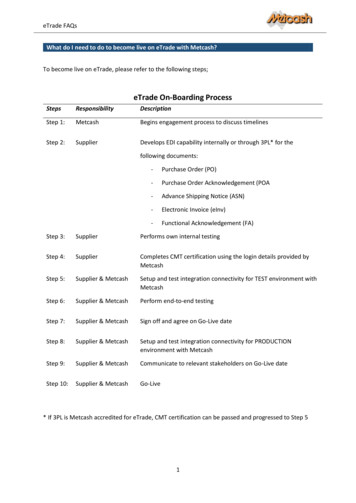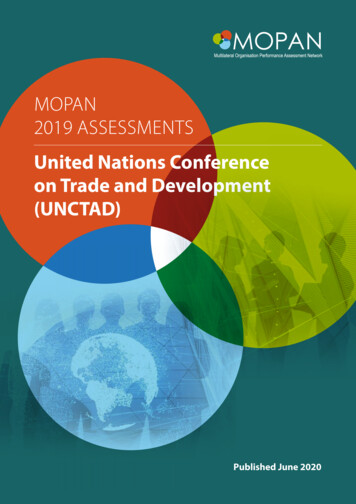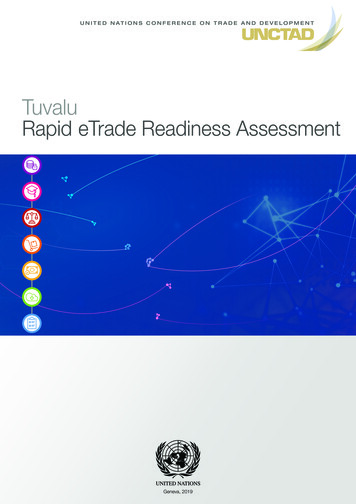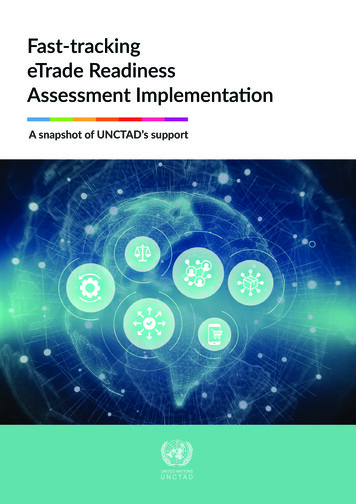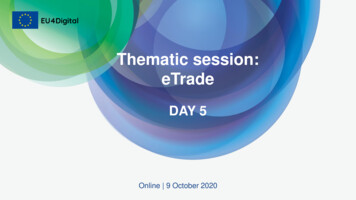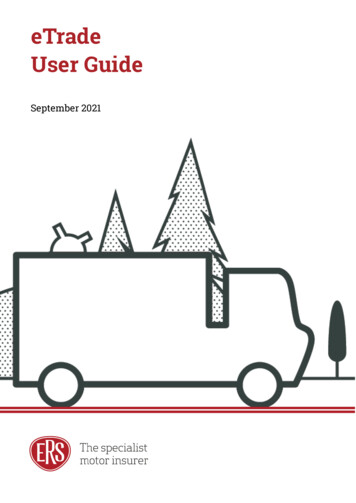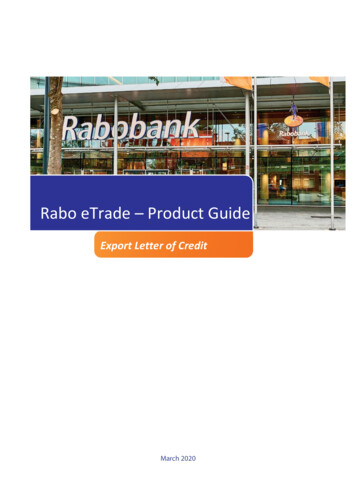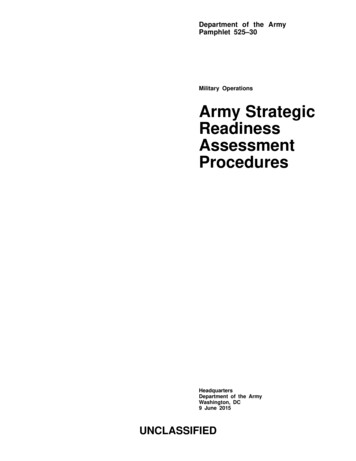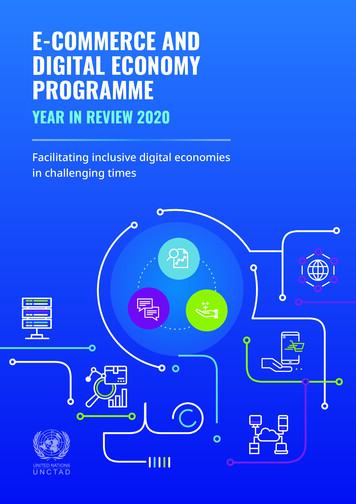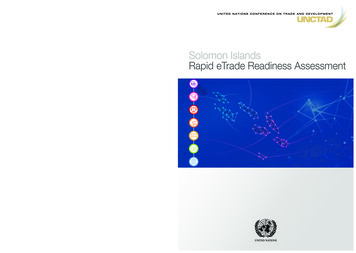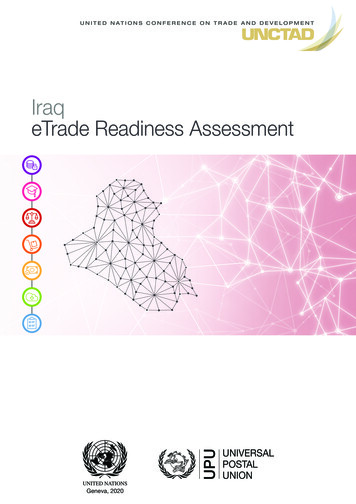
Transcription
U N I T E D N AT I O N S C O N F E R E N C E O N T R A D E A N D D E V E L O P M E N TUPUIraqeTrade Readiness AssessmentGeneva, 2020UNIVERSALPOSTALUNION
Iraq eTrade Readiness AssessmentII 2020, United NationsThis work is available open access by complying with the Creative Commons license created for intergovernmentalorganizations, available at e findings, interpretations and conclusions expressed herein are those of the authors and do not necessarilyreflect the views of the United Nations, its officials or Member States.The designation employed and the presentation of material on any map in this work do not imply the expressionof any opinion whatsoever on the part of the United Nations concerning the legal status of any country, territory,city or area or of its authorities, or concerning the delimitation of its frontiers or boundaries.Photocopies and reproductions of excerpts are allowed with proper credits.This publication has been edited externally.United Nations publication issued by the United Nations Conference on Trade and Development.UNCTAD/DTL/STICT/2020/7eISBN: 978-92-1-004972-6
NOTEIIINOTEWithin the UNCTAD Division on Technology and Logistics, the ICT Policy Section carries out policy-orientedanalytical work on the development implications of information and communication technologies (ICTs) ande-commerce. It is responsible for the preparation of the Digital Economy Report (DER) as well as thematic studieson ICT for Development.The ICT Policy Section promotes international dialogue on issues related to ICTs for development and contributesto building developing countries’ capacities to measure the information economy and to design and implementrelevant policies and legal frameworks. It also monitors the global state of e-commerce legislation (unctad.org/cyberlawtracker). Since 2016, the Section has coordinated a multi-stakeholders’ initiative entitled eTrade for all(etradeforall.org), which aims to improve the ability of developing countries, particularly least developed countries(LDCs), to use and benefit from e-commerce. The initiative is also behind the new eTrade for Women program,launched in 2019, which aims to promote a more gender-inclusive digital economy, in particular through itsnetwork of Ambassadors. These digital entrepreneurs are active in all developing regions and contribute tocapacity building, mentoring and awareness raising activities for more inclusive gender policies.Reference to companies and their activities should not be construed as an endorsement by UNCTAD of thosecompanies or their activities.The following symbols have been used in the tables:Two dots (.) indicate that data are not available or are not separately reported. Rows in tables have beenomitted in those cases where no data are available for any of the elements in the row;A dash (-) indicates that the item is equal to zero or its value is negligible;Reference to “dollars” (US ) means United States of America dollars, unless otherwise indicated;Details and percentages in tables do not necessarily add up to the totals because of rounding.Reference to “IQD” means Iraqi Dinar. For the purpose of this report: IQD 1 US 0.00084 (6 September 2019).
Iraq eTrade Readiness AssessmentIVPREFACEThe eTrade for all Initiative, launched at the fourteenth Ministerial Conference of UNCTAD in July 2016, is a practicalexample of how to harness the digital economy in support of the 2030 Agenda for Sustainable Development,notably Sustainable Development Goals (SDGs) 5, 8, 9, and 17. The initiative seeks to raise awareness, enhancesynergies, and increase the scale of existing and new efforts by the development community to strengthen theability of developing countries to engage in and benefit from e-commerce by addressing seven relevant policyareas: E-commerce readiness assessment and strategy formulation ICT infrastructure and services Trade logistics and trade facilitation Payment solutions Legal and regulatory frameworks E-commerce skills development Access to financingAs part of the initiative, demand-driven assessments are envisaged to provide a basic analysis of the currente-commerce situation in the countries concerned, and to identify opportunities and barriers. The resulting reportswill serve as valuable inputs to these countries’ involvement in various discussions related to e-commerce anddigital trade, such as in the context of the UNCTAD Intergovernmental Group of Experts on e-commerce and theDigital Economy.It may furthermore help developing countries and Least Developed Countries (LDCs) to identify areas in whichthey could benefit from assistance by partners of eTrade for all.The Iraq eTrade Readiness Assessment is the first assessment conducted by UNCTAD in a non-LDC country,adding to the twenty-five assessments conducted by UNCTAD in LDCs since 2017. It follows an enhancedmethodology, including an in-depth contribution by the Universal Postal Union (UPU) as a key partner in thisassessment.With much appreciation, I would like to acknowledge the International Islamic Trade Finance Corporation forfunding the eTrade Readiness Assessment of Iraq as well as for being a close partner within the eTrade for allinitiative. With the eTrade for all partners, UNCTAD is committed to supporting Iraq in their resolve to harness thepotential of e-commerce for development.Shamika N. SirimanneDirector, Division on Technology and Logistics, UNCTAD
PREFACEVAs a founding partner of UNCTAD’s eTrade for all initiative, the Universal Postal Union (UPU) attaches greatimportance to the eTrade Readiness Assessment process as an important tool to build an e-commerce enablingenvironment both nationally and globally.Iraq’s eTrade Readiness Assessment is an important milestone in the UPU’s contribution to the eTrade for allinitiative. For the first time, the UPU has assessed the national post’s payment (PRE) and digital readiness (DRE)for e-commerce at the same time. Combined with the UPU’s postal Operational Readiness for E-commerce(ORE) assessments, this new approach has provided a holistic and complete diagnosis of the situation and roleof the Post in Iraq as a key partner in the development of e-commerce from payment to delivery.While recognizing that the postal network, with its vast geographical coverage and multi-dimensional services, iswell placed to support e-commerce, the eTrade Readiness Assessment identifies a number of challenges for thepostal sector in meeting key requirements for the development of e-commerce in the country.In order to respond to the identified challenges, the report makes several recommendations that, if implemented,will enable the Iraqi Post to become a main actor in further e-commerce facilitation, especially in promoting SMEsengagement in e-commerce.This assessment should be followed by actions and the UPU looks forward to working closely with UNCTAD andinterested development partners to support the implementation of the report’s recommendations.Siva SomasundramDirector, Directorate of Policy,Regulations and Markets (DPRM),International Bureau, Universal Postal Union
Iraq eTrade Readiness AssessmentVIFOREWORDE-commerce has great potential to become a powerful driver of economic growth, inclusive trade, and jobcreation in the member countries of the Islamic Development Bank (IsDB) Group by offering the opportunity toaccess wider markets without the constraint of having to establish and maintain physical presence. However,some of our countries still face numerous challenges to develop their online presence, due to the unavailabilityof Information and Communication Technology (ICT), access to the required skills and financial support, limitedinfrastructure and adequate regulatory framework.In this context, at the International Islamic Trade Finance Corporation (ITFC) - member of the IsDB Group - weconsider that digitalization is now the future of trade, and one of our strategic focus in ITFC is to support ourmember countries to get the enabling environment for e-trade. Since 2017, ITFC has adopted a new modelthat goes beyond financing trade into building the capacities to meet the critical market needs of our membercountries.One of our member countries, Iraq, has recently entered into a new phase of post-conflict reconstruction. In linewith its 2030 Vision driven by digital transformation, ITFC, through its flagship program Aid for Trade Initiative forthe Arab States (AfTIAS), partnered with the United Nations Conference on Trade and Development (UNCTAD)and Universal Postal Union (UPU) to assess the readiness of post-conflict Iraq to engage in and benefit frome-commerce. Through UNCTAD’s eTrade Readiness Assessments, developing countries can take stock of theirICT capabilities and design a strategy to tackle challenges to and bottlenecks in the growth of e-commerce andthe digital economy.The eTrade Readiness Assessment of Iraq aims to increase national actions (policies and programs) that will helpraise its readiness and capacity to engage in and benefit from e-commerce; grant enhanced access to technicalcooperation opportunities available among eTrade for all partners and leverage possible venture opportunities byeTrade for all partner members.This UNCTAD assessment provides a roadmap for developing e-commerce in Iraq and supports the government’sgoals to upgrade ICT infrastructure, build digital trust by improving the legal framework and support e-governmentinitiatives.In this regard, I would like to sincerely thank UNCTAD for putting together this significant contribution to theevidence base for supporting digital development in Iraq.I would like to confirm that ITFC is committed to supporting its member countries’ trade-led development efforts,including leveraging technology for better trade.Eng. Hani Salem SonbolChief Executive OfficerInternational Islamic Trade Finance CorporationChairman, Aid for Trade Initiative for the Arab States (AfTIAS) Program
ACKNOWLEDGEMENTSVIIACKNOWLEDGEMENTSThis eTrade Readiness Assessment for Iraq was prepared by a team comprised of Shawqi Makhtoob, UNCTADconsultant, Cécile Barayre, Iris Macculi, Dominic Leong, and Mohamad Fakhreddin, under the overall guidance ofTorbjörn Fredriksson. Local inputs, technical support and guidance were provided by Ms. Rasha Saleh, nationalconsultant.In Iraq, the UNCTAD Team wishes to express their profound gratitude to the Honorable Dr. Naeem Al-Rubaie,former Minister for Communications; Mr. Adel Khudair Abbas, Director-General of the Foreign Economic RelationsDepartment, Ministry of Trade (MOT); Mr. Bassam Salim, Director-General of Iraqi Post and Head of Board ofCommissioners of Communication and Media Commission (CMC); Dr. Ali N. Al-Khwilidi, Head of Communicationand Media Commission (CMC); Mr. Monther Abdulqader Alsheikhly, Deputy Governor, Central Bank of Iraq (CBI);Ms. Dhuha Abdulkareem Mohammed, Director-General of Payments Directorate, Central Bank of Iraq (CBI);Mr. Azad Hussein Rasheed, Deputy Director General of Private Sector Development Department, Ministry ofTrade; Mr. Ja’afer Qumar Khwair, Iraqi Customs (IC); Mr. Murad Abdulsamad Hadi, Secretary of Information andCommunication Security, National Security Advisory of Iraq; Mr. Falah Ahmed Ajeel, Head of the Iraqi Associationfor Technology of Computer and Information System (IATCIS); Committee for Management & Coordinationof Governmental Activities Towards Establishing an E-Government; Mr. Ali Al-Sheikh, Green Universal forCommunication and Information Technology Company; and Mr. Ammar Mohammed Maki, Shopini Express.Contributions provided by experts from the following eTrade for all partner agencies have substantially improvedthe report: UPU, which has partnered in this assessment, UNCITRAL and the World Bank. Several contributionswere received from UNCTAD’s Division on Technology and Logistics, as well as the Division of Investment andEnterprise.UNCTAD is also grateful to H.E. Mr. Hussein Mahmoud Al-Khateeb, Permanent Representative of the Republicof Iraq to the United Nations Office and other international organizations in Geneva, and First Secretary Mr.Mahmoud Al Atiyyah, for their guidance and facilitation of the assessment process.The assessment benefited from the inputs of more than 90 institutions from the public and private sectors, aswell as non-state actors. The UNCTAD Team wishes to thank all individuals who completed the online eTradeReadiness surveys and participated in the focus group discussions, bilateral interviews and workshop that tookplace in Baghdad between 28 July and 2 August 2019.Desktop publishing was prepared by Keel Chan and the cover was designed by Magali Studer. The documentwas externally edited by Nancy Biersteker.Funding for this report was provided by the International Islamic Trade Finance Corporation (ITFC), a core partnerof the eTrade for all initiative.
VIIIIraq eTrade Readiness AssessmentTABLE OF CONTENTSNOTE. IIIPREFACE. IVFOREWORD. VIACKNOWLEDGEMENTS.VIIABBREVIATIONS.IXLIST OF FIGURES, TABLES AND BOXES.XIEXECUTIVE SUMMARY. 1METHODOLOGY. 8SUMMARY OF MAIN FINDINGS AND MAIN RECOMMENDATIONS. 4FINDINGS UNDER THE SEVEN ETRADE FOR ALL POLICY AREAS. 101. E-COMMERCE READINESS ASSESSMENT AND STRATEGY FORMULATION. 102. ICT INFRASTRUCTURE AND SERVICES. 213. TRADE LOGISTICS AND TRADE FACILITATION. 264. PAYMENT SOLUTIONS. 395. LEGAL AND REGULATORY FRAMEWORKS. 456. E-COMMERCE SKILLS DEVELOPMENT. 517. ACCESS TO FINANCING. 56CONCLUSION. 63THE WAY FORWARD: ACTION MATRIX. 64Annex I: Bibliography and websites used. 70Annex II: List of UNCTAD Rapid eTrade Readiness Assessments of LDCs. 72
BCINSAITITULDCAid-for-TradeAutomated System for Customs DataAutomated Teller MachineBusiness Women CenterBorder Ports CommissionCentral Bank of IraqCommunications and Media CommissionDigital Financial ServicesDevelopment PartnerDigital Readiness for e-commerceDistance to FrontierExchange-to-ExchangeCommittee for Management & Coordination of Governmental Activities Towards Establishingan E-GovernmentE-Government Development IndexE-Participation IndexEnhanced Integrated FrameworkExpress Mail ServiceE-commerce National Task ForceUnited Nations Economic and Social Commission for Western AsiaFederation of Iraqi Chambers of CommerceFinancial Service merGross Domestic ProductGeneral Iraqi Commission of CustomsIraqi Association for Technology of Computer and Information SystemInternational Air Transport AssociationIraqi DinarIslamic Development BankIraqi CustomsInformation and Communication TechnologyInternational Monetary FundIraqi PostInternet Service ProvidersICT Development IndexIraqi Federation of IndustriesIraqi National Business CouncilIraqi National Security AdvisorInformation TechnologyInternational Telecommunication UnionLeast Developed Country
MESOETFAUNCDFUNCITRALUNCTADUOITCUPUUS VASWEFWBGWCOWTOIraq eTrade Readiness AssessmentMiddle East and North AfricaMicrofinance institutionsMinistry of CommunicationsMinistry of TradeMicro, small and medium-sized enterprisesNational Development PlanNational Committee for Trade and Transport FacilitationNational Trade Facilitation CommitteeOrganisation for Economic Co-operation and DevelopmentOperational Readiness for E-commercePoint of SalePublic-private partnershipPayment Readiness for e-commercePayment Service ProviderSmall- and medium-sized enterprisesState-owned enterprisesTrade Facilitation AgreementUnited Nations Capital Development FundUnited Nations Commission on International Trade LawUnited Nations Conference on Trade and DevelopmentUniversity of Information Technology and CommunicationsUniversal Postal UnionUnited States DollarValue-added ServiceWorld Economic ForumWorld Bank GroupWorld Customs OrganizationWorld Trade Organization
LIST OF FIGURES, TABLES AND BOXESXILIST OF FIGURES, TABLES AND BOXESFIGURES1.Challenges Hindering Investing in E-commerce. 32.Assessment methodology. 83.Population Pyramid of Iraq, 2019. 114.E-Government Development Index and E-Participation Index, 2018. 165.eTrade Readiness Survey for Iraq: Key Actions to Enhance E-commerce. 206.Importance of Factors for Creating a Conducive Environment. 257.Proposed Transportation Sector Projects. 278.Preferred Vendors to Ship Products among Private Sector Companies. 289.Regional Ranking in Trading Across Borders. 2910. Digital and Sustainable Trade Facilitation. 3311. Main Reasons to Invest in e-commerce Solutions in the Private Sector. 4012. Prevalence of Payment Systems in the Private Sector. 4113. Key Stakeholders’ Opinion of the Importance of Government Regulations to Enhance Trust. 4614. Needs and Opportunities for e-commerce Development in Iraq. 5215. E-commerce Skills and Capacity-building Needs. 5316. World Bank’s Doing Business 2020, Getting Credit in Iraq and Comparator Economies. 5617. Access to Finance, Needs and Opportunities for e-commerce Development in Iraq. 57TABLES1.Total Exports, Iraq, 2014-2018 (in Billion IQD and Million US ). 112.UNCTAD B2C E-commerce Index for Iraq 2017-2018-2019. 133.UNCTAD B2C E-commerce index, Comparison of Iraq to Other Countries in the Region, 2019. 134.Key Access to ICT Indicators. 235.Comparison of Service Prices of the Three Mobile Operators in Iraq. 246.Scope of the Three UPU Technical Assistance Projects. 307.LPI Global Ranking, 2018. 338.UPU Recommended Priority Interventions for the Iraqi Post. 379.Growth Trend in e-payment Solutions in 2016-2018. 3910. Depth of the banking sector: Selected indicators. 59BOXES1.Shopini. 122.The e-Regulations System in Iraq. 173.Customs Clearance System of Postal items. 344.ASYCUDA World - Customs Reform & Automation. 355.NCTTF’s Objectives and Priority Topics related to e-commerce. 386.International Principles for Effective Consumer Protection Legislation. 477.Iraqi Business Women Center (BWC). 61
XIIIraq eTrade Readiness Assessment
EXECUTIVE SUMMARY1EXECUTIVE SUMMARYIntroductionIraq’s economy is at a turning point. For decades ithas relied on crude oil production and export to drivethe economy. In many ways, this was a success story,with oil revenue contributing to healthy GDP growthand funding a wide range of government services.With the relatively improved security environment anda shift towards post-conflict reconstruction, Iraq isnow well-positioned to diversify its economy and takeadvantage of new digital technologies.The economy is gradually improving, with 4.4 percent GDP growth in the first half of 2019. This growthwas driven by a rise in crude oil production, but alsoa rebound in non-oil economic activity. The Iraqieconomy also received a boost of confidence in 2019with the signing of several trade agreements with itsneighbors, including Iran and Saudi Arabia.Looking towards the future, there is a stark need todiversify the Iraqi economy. Oil accounts for morethan 90 per cent of government revenue, and in2018 crude oil constituted 98 per cent of exports.Increasing non-oil economic activity would diversifythe Iraqi economy, increase employment opportunitiesand create new value chains. Increasing regional andinternational trade will be key.Iraq also has a very young population, with nearly 60per cent of the population under 24 years old. The oilsector employs just one per cent of the population,however, and the public sector can no longer affordto absorb the thousands of graduates the countryproduces. In this context, the role which e-commercecan play is promising. There is deep appreciation ofthe importance of e-commerce among the people ofIraq and a few promising startups. However, very fewpractical steps have been taken to create an enablingenvironment for e-commerce to thrive, and no nationalplans have been established to move Iraq towards adigital future.E-commerce readiness assessment and strategyformulationThe most recent national development plans andstrategies established by the Government of Iraqprovide the framework for economic development,trade expansion, services provision and infrastructuredevelopment. Despite covering many sectorsand industries, the plans do not explicitly mentione-commerce nor its great potential. However, a fewnational bodies have developed initiatives that supportthe growth of e-commerce.The environment for e-commerce growth in Iraq isrelatively weak and there are many challenges thatneed to be addressed. Key barriers include poor andslow Internet connectivity coupled with high prices,inadequate ICT, transport and logistics infrastructure,the lack of legislation governing e-commerce andrelated services, absence of laws and incentives topromote investment in e-trade, inefficient postalcustoms-transport processes, restrictions on moneyand profits transfer, lack of knowledge and skillsrelated to the digital economy, online privacy concernsand the lack of user trust in online transactions.Moreover, Iraq lacks a forum to foster public-privatedialogue on issues related to e-commerce and thedigital economy. The in-country consultations forthe preparation of this assessment were a step inthe right direction, with strong interest in developingstronger dialogue and partnerships shown by bothpublic and private sector stakeholders. In this regard,establishing an E-commerce National Task Force(ENTF) in the Prime Minister’s Office would be animportant step to guide the formulation and followup on the implementation of a national e-commercestrategy.ICT infrastructure and servicesThe ICT sector in Iraq has a key role to play notonly in the expansion of e-commerce but also forachieving overall sustainable development. Rebuildinginfrastructure damaged or destroyed by decadesof conflict is crucial. Although the importance ofICT is universally recognized and there seems tobe willingness among major stakeholders to worktogether, no agreed-upon national strategy has beendeveloped for the sector.The mobile services market is fully liberalizedwith three nationwide operators. Public-privatecooperation in the sector is limited and there appearto be some duplication of visions and responsibilities
2Iraq eTrade Readiness Assessmentbetween the Ministry of Communications (MOC) andCommunication & Media Commission (CMC). Anddespite the affordable prices, adoption rates for mobileand fixed broadband services are low compared toother Arab countries.is likely to take hold among the growing youthpopulation, who tend to be more technologicallysavvy than previous generations. Payment solutionscould also offer a secure, affordable and convenientsolutions for remittances from the diaspora.Trade logistics and trade facilitationLegal and regulatory frameworksProlonged conflict has caused major damage tothe existing transport infrastructure in Iraq, includingroads, bridges and railways. Reconstruction ofthis infrastructure continues and implementation ofspecific projects should be accelerated in order toimprove logistics and trade facilitation.Moreover, Iraq lacks a comprehensive legal andregulatory framework regulating ICT.Postal services, a key enabler for e-commerce growth,has experienced important improvements in the lastfew years and are generally in line with internationalstandards. The UPU assessment of the Iraqi Post’sreadiness for e-commerce highlights many operationaland digital gaps and shortcomings including theabsence of coordination between the Post andother institutions for e-commerce development. Theassessment also highlighted the priority interventionsfor the Iraqi Post in order to develop the neededcapacity for cross-border e-commerce. The Iraqi PostInitiative proposes an important way to move forwardif implemented with support from local stakeholdersand international agencies. The Iraqi Post could playa key role in facilitating MSMEs diffusion into thee-commerce arena by providing a hub and acceleratorfor MSMEs, in addition to providing a one stop shopfor e-commerce facilities.The current setup of the Iraqi Customs is one of themain challenges for trade facilitation. Key reforms areneeded to comply with international requirements andto improve coordination, especially for cross-bordertrade.Payment solutionsIraq remains a cash-based society and further work isneeded to develop and introduce e-payment solutions.Developing e-payment solutions and introducing themto consumers is a top priority for both the public andprivate sectors.Lack of trust in online transactions among consumersand merchants remains the primary barrier and willrequire widespread awareness-raising backed bysecure solutions. Adoption of cashless paymentsIn its current state, the Iraqi legal and regulatoryframework is insufficient to foster e-commerce growth.It has key shortcomings in the areas of e-transactions,consumer protection, privacy, data protection,cybercrime and intellectual property.While some laws have been drafted and promulgated,they are incomplete and do not adequately address theunique needs of e-commerce and the evolving digitaleconomy, nor the specific needs of SMEs. The weaklegal and regulatory framework has contributed to thecurrent reality, where both consumers and businessesare hesitant to conduct online transactions. Bothgrou
Iraq's eTrade Readiness Assessment is an important milestone in the UPU's contribution to the eTrade for all initiative. For the first time, the UPU has assessed the national post's payment (PRE) and digital readiness (DRE) for e-commerce at the same time. Combined with the UPU's postal Operational Readiness for E-commerce
![Kenya: eTrade Readiness Assessment [ADVANCE COPY]](/img/24/dtlecdc2022d2-en.jpg)
